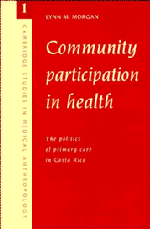Book contents
- Frontmatter
- Contents
- List of illustrations
- List of tables
- Acknowledgments
- List of abbreviations
- 1 The political symbolism of health
- 2 Banana medicine: the United Fruit Company in Costa Rica
- 3 The international imperative: foreign aid for health in Costa Rica
- 4 The primary health care movement and the political ideology of participation in health
- 5 Participation in Costa Rica: dissent within the state
- 6 La Chira: participation in a banana-growing community
- 7 The political economy of participation
- References
- Index
2 - Banana medicine: the United Fruit Company in Costa Rica
Published online by Cambridge University Press: 29 January 2010
- Frontmatter
- Contents
- List of illustrations
- List of tables
- Acknowledgments
- List of abbreviations
- 1 The political symbolism of health
- 2 Banana medicine: the United Fruit Company in Costa Rica
- 3 The international imperative: foreign aid for health in Costa Rica
- 4 The primary health care movement and the political ideology of participation in health
- 5 Participation in Costa Rica: dissent within the state
- 6 La Chira: participation in a banana-growing community
- 7 The political economy of participation
- References
- Index
Summary
Behind every bunch of bananas stands a man, and that man cannot be a sick man.
Wilson 1942:274Long before foreign organizations or the national state got involved in doctoring, Costa Rica's inhabitants managed their own health care. Prior to the introduction of biomedicine, people relied on various sociocultural adaptations, including personal hygiene and settlement patterns, to prevent sickness. Indigenous and traditional healers practiced their craft (Richardson and Bode 1971; Low 1985), while a rich herbal pharmacopoeia provided the first line of attack against disease. Popular classifications even today include a number of illnesses not recognized by biomedically trained doctors (Simpson 1983). In these ways, community involvement in health care is far from new. Communities have always been active in safeguarding and attending to their own health and, in any case, until very recently could not afford to wait for outside assistance.
The circumstances surrounding the settlement of Costa Rica's Atlantic coast in the late 1800s undermined community self-sufficiency. The province of Limon, as the region along the Atlantic littoral was known, had been sparsely inhabited until the rise of the banana industry in the late nineteenth century created a demand for vast numbers of male workers. The men who came to clear the land and plant bananas were mainly transient laborers, uprooted from their families and in many cases from their countries of origin. The new settlements that sprang up along the coast were thus “artificial” communities. Because they lacked the healing traditions of home, alternative strategies had to be devised for protecting health and combating disease.
- Type
- Chapter
- Information
- Community Participation in HealthThe Politics of Primary Care in Costa Rica, pp. 17 - 31Publisher: Cambridge University PressPrint publication year: 1993

